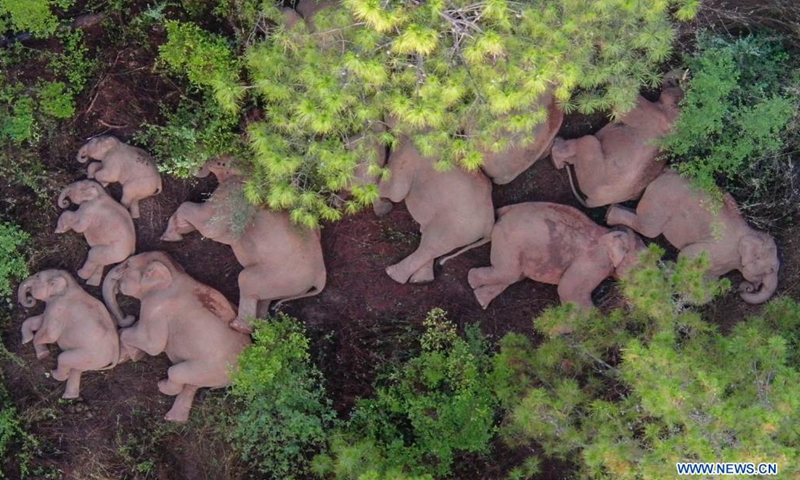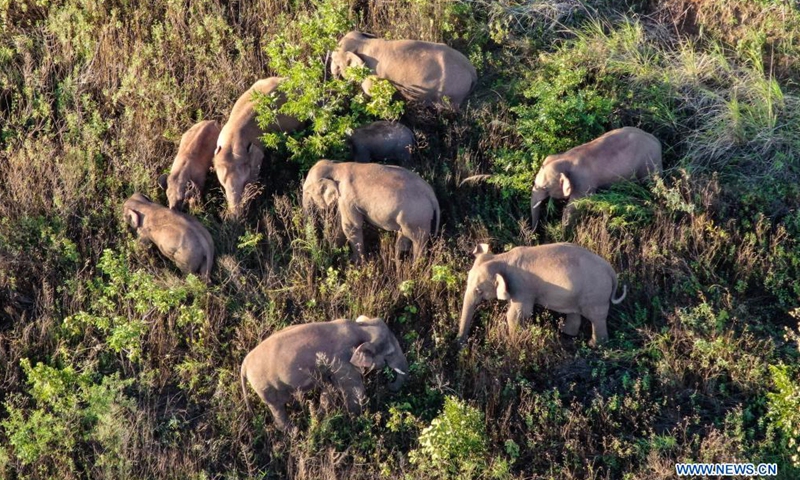The wild elephant herd’s journey is continuing and it was welcomed by curious villagers in Xinping county of Yuxi, Southwest China’s Yunnan, who were amazed at these cute giant animals and the technologies being used to monitor their journey.
“Have you ever seen an elephant?” Local staffers monitoring the herd asked a teenage girl, and the girl responded shyly “never.” Neither had her 80-year-old grandmother.
Pictures of the herd from drones have sparked interest from many people.
A small “elephant-chasing” squad composes of a laptop and three drones and operators. Villagers circled the squad, fixing their eyes on the elephants on the computer, and asked all kinds of questions – what do they (elephants) eat? How heavy are they? How long do they sleep at night?
“The baby elephant looks so small, how can they catch up with the herd? Aren’t they tired?” one grandma asked.
The southwestern countryside has become a temporary zoology classroom.

Screen grab from drone video shows the Asian elephants in Eshan County of Yuxi, southwest China’s Yunnan Province on June 20, 2021.Photo:Xinhua
Some villagers were worried about the losses the elephants could cause to crops, but they were relieved when they learned that the losses will be covered by government-sponsored insurances.
By June 28, insurance companies had already received 995 elephant-related cases involving 6.36 million yuan ($987,800). Compensation of 5.06 million yuan for 2,803 households has been completed.
A net user said jokingly “wow, they [farmers] should appreciate the elephants for saving them from collecting, transporting and selling the harvests.” “Elephants, free treats tonight!” Said another Weibo user.
Li Renpei, a drone operator of Yuxi public security bureau, told media that the squad is usually stationed in remote villages. They have to charge the equipment in order to use it.
“That is what we call safety of humans and elephants, and harmony between the two,” Li said.
Due to widespread cases of people dying from eating poisonous fungus, some people were concerned that the elephants may suffer the same fate.
But experts reassured the public that elephants have a strong capability to identify food species in the wild. In addition, due to their weight, they must consume large amounts to be poisoned, which is unlikely to happen since they eat “safe food.”

Aerial photo taken on June 13, 2021 shows a herd of wild Asian elephants in Shijie Township of Yimen County, Yuxi City, southwest China’s Yunnan Province.Photo:Xinhua
The elephant herd had left their border habitat for months. A baby elephant was born en route and a male elephant left the herd on June 6.
After more than a month of a lonely journey, the elephant was 72 kilometers away from the herd and approaching highways and railways leading to the city center of Yuxi. Since it is unlikely to return to the herd naturally, expert team on site decided to help it return home. They sent it back to the natural reserve in Xishuangbanna on Wednesday.
Aerial photo taken on June 20, 2021 shows the Asian elephants in Dalongtan Township of Eshan County, Yuxi City of southwest China’s Yunnan Province.Photo:Xinhua


